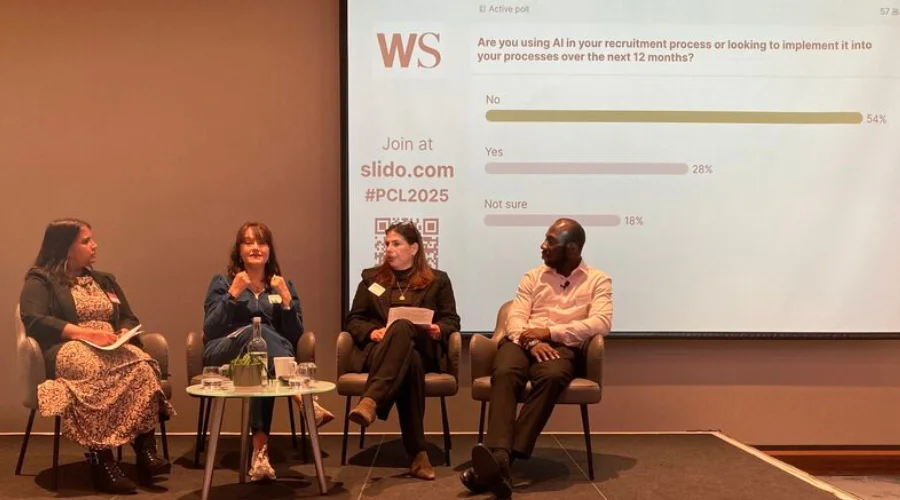
Quick CV Dropoff
Want to hear about the latest non-profit and public sector opportunities as soon as they become available? Upload your CV below and a member of our team will be in touch.

The sector's diverse tasks require professionals with different skills to tackle issues effectively. As societal needs change, there's a growing need for talented individuals who want to make a positive impact. This highlights the importance of smart recruitment strategies to attract great talent from different backgrounds.
Recognising the need to diversify talent acquisition, this blog offers practical strategies for charities to recruit outstanding professionals from various industries and sectors by building a positive brand identity.
Employer branding is about how a company builds its reputation to attract and keep top talent. It includes everything a company does to make itself an attractive place to work and stand out from competitors, including shaping perceptions through culture, mission, values, employee experiences, and communication strategies.
The best way to appeal to talent in other sectors is to perfect your outgoing image. A solid brand helps organisations compete for top talent, addresses misconceptions, and encourages other professionals to enter the charity sector.
Effective branding can differentiate you from other organisations. This entails conveying clear messages, establishing a distinct brand identity, and showcasing achievements, enabling successful charity recruitment.
Let's explore five strategies to enhance and uphold your employer brand:
When promoting your charity to potential recruits, it's crucial to highlight its mission and impact while highlighting what sets it apart. Ask yourself what makes your charity stand out and tailor your charity recruitment approach to emphasise these unique aspects, clarifying why candidates should choose your organisation over others or their previous industries.
Clearly articulate your charity's value proposition, whether it's your innovative approach, community focus, or collaborative culture, communicating it authentically to attract candidates who resonate with your mission.
Instead of just stating what your charity does, show how it makes a difference. Use compelling stories, data, and visuals to connect emotionally with potential recruits and illustrate the real impact of your work. Research what motivates potential recruits and align your mission with their values. Highlight how working at your charity contributes to something bigger than themselves, appealing to candidates seeking purpose-driven work.
Highlight specific goals your charity aims to achieve, such as commitments to sustainability or other impactful initiatives that resonate with prospective employees. Research indicates that many candidates prefer working for organisations that communicate a clear message.
Showcase your charity's commitment to your goals and achievements to attract socially conscious professionals.
Professionals, especially Gen Z, value transparency in the workplace. Showcase your charity's commitment to transparency and offer opportunities for involvement in its initiatives, attracting candidates who value openness and engagement. Provide insights into how your charity fosters employee engagement and involvement, showcasing initiatives that promote teamwork, collaboration, and a positive work environment.
Like in any industry, charity recruitment has specific challenges. To overcome them, you must recognise and identify them, including why they may affect the hiring process or prevent the attraction of talent from other sectors.
Misconceptions often prevent people from working in the charity sector, yet they can be dispelled through strategic branding efforts. Let's explore how non-profit organisations can address these barriers while leveraging their unique strengths.
Considering the misconceptions, it's essential to highlight the distinct advantages of working in the charity sector. Unique benefits and perks
While it's essential to consider competitive pay rates, charities can also offer various incentives to attract top talent.
If your organisation can't match the salaries offered in other sectors, consider offering additional benefits to compensate. These include flexible work arrangements, generous leave policies, and personal and professional development opportunities. Even if the financial package is lower, the success of these incentives depends on effective marketing and communication.
Examples of critical benefits your organisation can offer to recruit into the charity sector from other industries include:

Charity organisations must address concerns and misconceptions to recruit talent from other sectorseffectively while tailoring benefits to appeal to different professionals. Understanding that preferences vary across sectors, charities should offer unique incentives to attract talent.
In our 2023 non-profit salary, rewards and retention survey report, we surveyed a variety of professionals within the sector and found the most common benefits desired by the general public included the following:
Ensuring that your employer brand, message, and working culture are tailored to these demands will increase the success of the charity recruitment process.
Research indicates that 87% of individuals prioritise flexibility in their work arrangements. Emphasising flexible schedules, remote work options, and compressed workweeks can cater to employees' diverse needs.
Additionally, highlighting generous leave policies and well-being initiatives, such as wellness programs and counselling services, demonstrates a commitment to supporting employees' physical and mental health. By promoting these benefits, charities can attract talent seeking a supportive and accommodating workplace culture.
Diversity and inclusion are vital across all sectors in today's professional world. Studies show that 80% of people prefer to work for companies that prioritise diversity, equity, and inclusion. This highlights the importance of creating diverse and inclusive environments, including in the charity sector.
Transitioning from the fast pace of the corporate world to the charity sector often requires ongoing development opportunities. To attract professionals seeking meaningful career growth, charities should offer comprehensive training, mentorship programs, and skill development opportunities.
Organisational culture is a significant factor in job seekers' decisions, with 46% citing it as the main reason for seeking new opportunities. Charities can attract top talent by showcasing a positive work environment with supportive teams, collaboration, and a sense of belonging.
Working in the charity sector allows individuals to contribute to a meaningful purpose, and charity recruitment should reflect this. When charities have a clear mission and impact, they attract like-minded individuals passionate about making a difference. By sharing a compelling message aligned with their mission, charities can inspire others to join their cause and drive positive change.
To strengthen your employer branding strategy, it's crucial to customise and tailor your content to reflect your organisation's message, values, and target audience, along with the changing desires of your potential workforce. This personalised approach is fundamental when engaging with professional Gen Z and Millennials, who prioritise authenticity and relevance.
Social media platforms can significantly enhance your brand's visibility and appeal, given that many millennials have found their last position through such channels. With over 84% of organisations already using social media for recruitment and another 9% planning to do so, it's evident that this method of communication holds immense potential for reaching and attracting talent.
Advertise and promote your brand ideals on the following platforms to bring your employer branding into the digital age and attract more professionals:
The majority of your target audience in recruitment will use social media and communication platforms. If your organisation does not use these, you will appear unrelatable and not transparent.
Charity organisations must strategically tailor their brand approach to attract professionals from diverse industries. By aligning content and brand messaging with specific industries like education, healthcare, legal, and business consulting, charities can effectively engage the right audience.
Highlighting transferable skills in job descriptions is crucial to broadening the candidate pool. By showcasing how experiences from different sectors can enrich the organisation's mission, charities can appeal to professionals seeking new avenues to apply their expertise. For instance, individuals with backgrounds in finance and accounting, human resources, marketing and communications, technology and data can find meaningful roles within charitable organisations.
By emphasising the benefits of transferable skills, charities can address the perception that professionals may lack relevant experience for the charitable sector, thereby personalising the recruitment approach.
Implementing inclusive charity recruitment processes, such as internships, mentoring programs, or skills development workshops, demonstrates a commitment to nurturing talent from various backgrounds. These initiatives attract potential candidates and foster growth within the organisation. By showcasing opportunities for professional growth and meaningful contributions, charities can position themselves as attractive destinations for professionals looking to make a difference in the world.
Retention is critical to any recruitment strategy. While attracting talent from other sectors is essential, keeping that talent within your organisation requires a similarly strategic approach. Recruitment and retention go hand in hand, and with over 70% of charities facing challenges in recruiting and retaining talent in 2023, the need for effective retention strategies is more pressing than ever.
Retaining valued employees is crucial for showcasing your organisation as a positive workplace that promotes growth, offers opportunities for advancement, and values its employees. When talented individuals choose to stay with your organisation, it boosts morale and enhances your reputation as an employer.
For more information on retaining talent and decreasing staff turnover, delve into our guide on how to have exceptional talent in the charity sector.

Mastering charity recruitment and attracting talent from other industries is crucial for the long-term effectiveness of charitable organisations. Diversifying talent acquisition brings various benefits, including enhanced trust and credibility, creativity and innovation, improved decision-making, and access to specialised skills.
Effective employer branding plays a pivotal role in this process, helping charities to differentiate themselves, address misconceptions, and appeal to professionals seeking purpose-driven work. Understanding the evolving desires of the workforce enables charities to tailor their recruitment strategies accordingly. Leveraging communication platforms and relating to potential employees in a relatable and transparent manner through social media and other channels is essential for reaching and engaging diverse talent pools.
By maximising charity recruitment through diverse talent acquisition and implementing strategic retention efforts, charitable organisations can build solid and impactful teams that drive meaningful change and contribute positively to society's most pressing challenges.
Since 1996, we've provided excellent recruitment services nationwide, supporting clients and candidates. If you are an organisation in need of driven talent for your charity recruitment..
Get in touch today to learn more about how we can support your recruitment objectives.